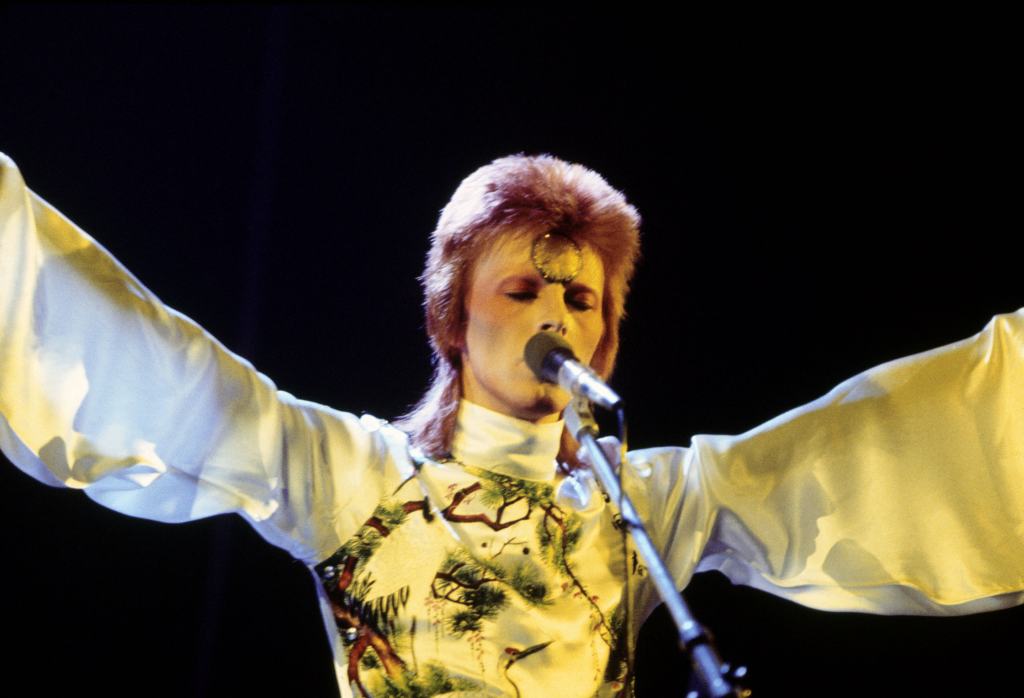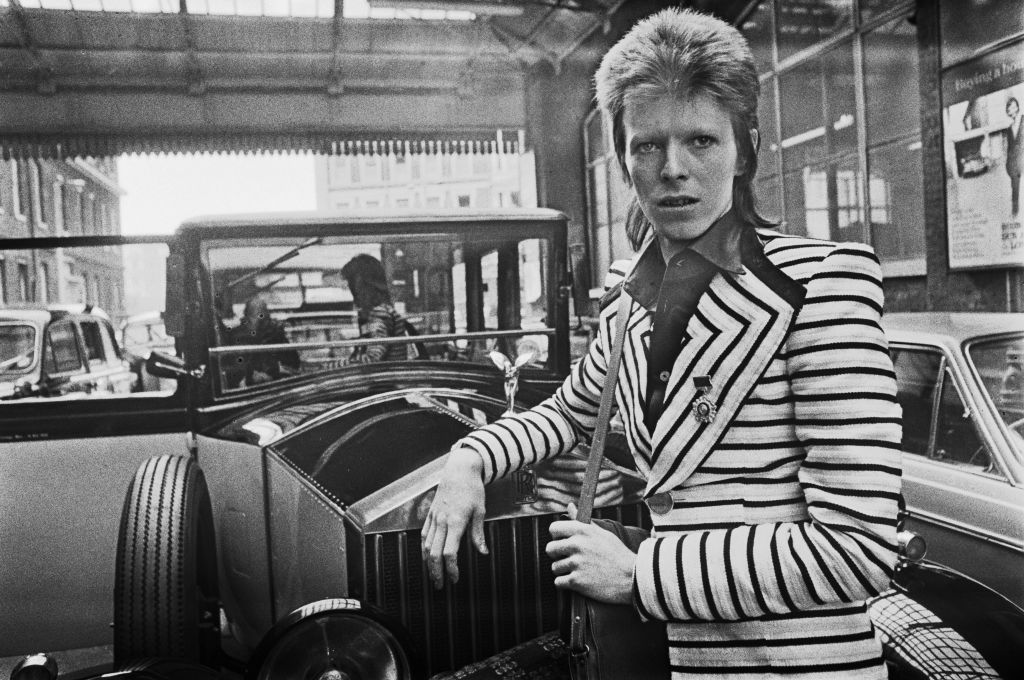It’s hard to imagine how baffled the British public must have been by the arrival of David Bowie on to TV screens in the early 1970s. With his saffron hair, make-up and androgynous clothes, superficially he looked like a rejection of everything his post-war south London childhood had taught him.
One of the most pivotal scenes in Moonage Daydream, the recent film about his life, is his 1973 interview with chat show host Russell Harty. Throughout this awkward cross-examination, Harty searches for a label he can stick on Bowie for the benefit of discomfited viewers. ‘Are those men’s shoes? Or women’s shoes? Or bisexual shoes?’ Harty inquires, looking down at Bowie’s strappy red and gold platform sandals. ‘They’re shoe-shoes, silly!’ shoots back Bowie, helpfully adding that his spangly tights are from Woolworths.
The exchange is classic Bowie, and not just because it shows how skilfully he dodged any attempts to pigeonhole him. It’s also a joyful reminder of how, despite his shape-shifting personas, there was one constant – his Britishness. After all, only an Englishman schooled in Winnie the Pooh, Enid Blyton and Monty Python could have used the word ‘Silly’ to disarm his inquisitor with such faux innocence – and on such a controversial subject for its time.
Only an Englishman schooled in Winnie the Pooh, Enid Blyton and Monty Python could have used the word ‘Silly’ to disarm his inquisitor with such faux innocence
Throughout the two hours and 14 minutes of the film, we see many, many more interviewers try and fail to pin Bowie down. He eludes even the best of them, leaving another veteran interviewer, Dick Cavett, to ask in anguished tones: ‘Where did he come from? Is he a creature of a foreign power? Is he a creep? Is he dangerous? Is he smart? Dumb? Nice to his parents? Real? A put-on? Crazy? Sane? Man? Woman? Robot? What is this?’
The film attempts to tackle those questions with a whirlwind of concert performances, interview clips and musings from Bowie himself. But though there are no simple answers, one thing you come away with is an appreciation for how very English he was – in all the best ways. Throughout his career, Bowie embodied the best of British virtues: eccentricity, individualism and good manners.
Bowie was a key member of that group of British eccentrics – along with William Blake, Lord Byron, Vivienne Westwood, John Lydon, Kate Bush, Tilda Swinton, Jarvis Cocker and Grayson Perry – who were both grounded in the culture they were born into and made by their determination to kick against it. Bowie, for instance, kept that safest of British forenames, David – and added to it the word for a particularly vicious knife. He was fascinated by titles in his work, styling himself as the ‘The Thin White Duke’ and ‘Major Tom’. But when in 2003 he was offered the chance to become a Sir in real life, he turned it down.
Living abroad – first in Berlin, then in LA before settling in New York – suited him as perfectly as it did those other English originals, John Lennon and Quentin Crisp, who used it as backdrop to throw their Britishness into sharper relief. And while other artists of his era seemed desperate to crack America, Bowie seemed to do it effortlessly, while still making British in-jokes about free school milk and the Norfolk Broads. In his acting roles he mostly chose to play his parts as an Englishman, despite a gift for mimicry – and he made it sexy to be a pasty-faced and snaggle-toothed Englishman in a way no one else has ever managed.

But watching Moonage Daydream made me realise that Bowie was more than a quintessential Englishman – he was the model of a Renaissance Englishman, too. Many of those we tend to associate with this label, such as Henry VIII or Winston Churchill, were polymaths and free-thinkers who could alter the course of history in the morning and dash off a catchy tune like ‘Greensleeves’ or a definitive biography in the afternoon. Bowie was from the same mould.
Many of the sequences in Moonage Daydream show former art student Bowie poring over his canvases, making it clear that his paintings were as important to him as his music. He was also a visionary. The internet had barely moved beyond dial-up when in 1999 he was already telling a sceptical Jeremy Paxman how much it would change the world.
And then there is Bowie the philosopher. The film is peppered with his observations, including that ‘All people, no matter who they are, all wish they’d appreciated life more’. This was critical to who Bowie was; his polite and articulate responses in Moonage Daydream illustrate why his Englishness was the perfect counterpoint to his weirdness.
Bowie’s death, on 10 January 2016, came two days after the release of his final album, Blackstar. There were pictures of him on the promotional circuit looking as sharp and as in love with life as he had ever done. We had no idea he had been discreetly saying goodbye. It later emerged that when he had been diagnosed with liver cancer, around 18 months earlier, he had overcome his fear of flying to make one last visit to London. During the trip, he had taken his wife Iman and their teenage daughter Alexandria to see the sights, including the Tower of London, but also his Brixton birthplace.
It took Kate Bush, an artist who shared much of the same cultural DNA, to pinpoint how important his birthplace had been to him. In the days after his death, she told the Guardian that Bowie was ‘wonderfully eccentric in a way that only an Englishman could be’. And she added: ‘He was ours.’






Comments